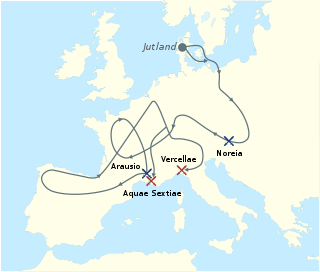Related Research Articles

This article concerns the period 109 BC – 100 BC.

The Battle of Arausio took place on 6 October 105 BC, at a site between the town of Arausio, and the Rhône River. Ranged against the migratory tribes of the Cimbri under Boiorix and the Teutoni under Teutobod were two Roman armies, commanded by the proconsul Quintus Servilius Caepio and consul Gnaeus Mallius Maximus. However, bitter differences between the commanders prevented the Roman armies from co-operating, with devastating results. The terrible defeat gave Gaius Marius the opportunity to come to the fore and make radical reforms to the organisation and the recruitment of Roman legions. Roman losses are described as being up to 80,000 troops as well as another 40,000 auxiliary troops (allies) and servants and camp followers, virtually all of their participants in the battle. In terms of losses, the battle is regarded as one of the worst defeats in the history of ancient Rome.
Quintus Servilius Caepio was a Roman statesman and general, consul in 106 BC, and proconsul of Cisalpine Gaul in 105 BC. He was the father of Quintus Servilius Caepio and the grandfather of Servilia.

Quintus Caecilius Metellus Macedonicus was a statesman and general of the Roman Republic during the second century BC. He was praetor in 148 BC, consul in 143 BC, the Proconsul of Hispania Citerior in 142 BC and censor in 131 BC. He got his agnomen, Macedonicus, for his victory over the Macedonians in the Fourth Macedonian War.
Gaius Norbanus was a Roman politician who was elected consul in 83 BC alongside Lucius Cornelius Scipio Asiaticus. He committed suicide in exile at Rhodes after being proscribed by Lucius Cornelius Sulla shortly after the latter's victory in the civil war.

This is a historical timeline of Portugal.
Gnaeus Mallius Maximus was a Roman politician and general.
Quintus Poppaedius Silo was a leader of the Italian tribe of the Marsi and one of the leaders of the Italian rebels during the Social War against Rome. Poppaedius was called the 'heart and soul' of the rebellion. He was a friend of Marcus Livius Drusus the Younger.
Quintus Servilius Caepio was a Roman patrician, statesman and soldier. He was the son of Quintus Servilius Caepio who was consul in 106 BC and who lost his army during the Battle of Arausio. He was elected praetor some time in the last 90s BC and fought for Rome during the Social War. He was killed in the second year of the war while fighting the Marsi by Quintus Poppaedius Silo.
Quintus Fabius Maximus Eburnus was a Roman statesman of the patrician gens Fabia. He was consul in 116 BC.
Gaius Laelius C.f. Sapiens, was a Roman statesman, best known for his friendship with the Roman general and statesman Scipio Aemilianus. He was consul of 140 BC, elected with the help of his friend, by then censor, after failing to be elected in 141 BC. Gaius Laelius Sapiens was the son and heir of the Punic War general Gaius Laelius, himself consul in 190 BC. This Laelius had been former second-in-command and long-time friend, since childhood, of the Roman general and statesman Scipio Africanus. The younger Laelius was apparently born around 188 BC, after his father had become consul but had failed to win command of the campaign against Antiochus III the Great of Syria, which would have made him a rich man. His mother's name is unknown.
Caepio may refer to:
Quintus Servilius Caepio was a Roman aristocrat, and the adoptive father of Brutus, the assassin of Julius Caesar.
The gens Servilia was a patrician family at ancient Rome. The gens was celebrated during the early ages of the Republic, and the names of few gentes appear more frequently at this period in the consular Fasti. It continued to produce men of influence in the state down to the latest times of the Republic, and even in the imperial period. The first member of the gens who obtained the consulship was Publius Servilius Priscus Structus in 495 BC, and the last of the name who appears in the consular Fasti is Quintus Servilius Silanus, in AD 189, thus occupying a prominent position in the Roman state for nearly seven hundred years.

The Gold of Tolosa is the appellation used to refer to a semi-legendary treasure hoard seized by the ancient Roman proconsul Quintus Servilius Caepio from the Volcae town of Tolosa, modern-day Toulouse.
Quintus Fabius Maximus Servilianus was the adoptive son of Quintus Fabius Maximus Aemilianus and the natural son of Gnaeus Servilius Caepio --hence the adoptive cognomen Servilianus. He was consul of the Roman Republic in 142 BC together with Lucius Caecilius Metellus Calvus. He was the brother of Gnaeus Servilius Caepio and Quintus Servilius Caepio. All three brothers were commanders in the Roman Province of Hispania Ulterior and fought in the Lusitanian War.
Gnaeus Servilius Caepio was a Roman statesman. The son of the consul of 203 BC, Gnaeus Servilius Caepio, he also served as Roman consul in 169 BC alongside Quintus Marcius Philippus. He also served as Curule Aedile in 179 BC and as Praetor in 174, when he obtained the province of Further Spain.
Quintus Servilius Caepio may refer to:
Marcus Porcius M. f. M. n. Cato was the father of Cato the Younger. His promising political career was cut short by his sudden death, early in the first century BC.
References
- ↑ Smith, William (1870). Dictionary of Greek and Roman biography and mythology. 1. Boston, Little. p. 534.